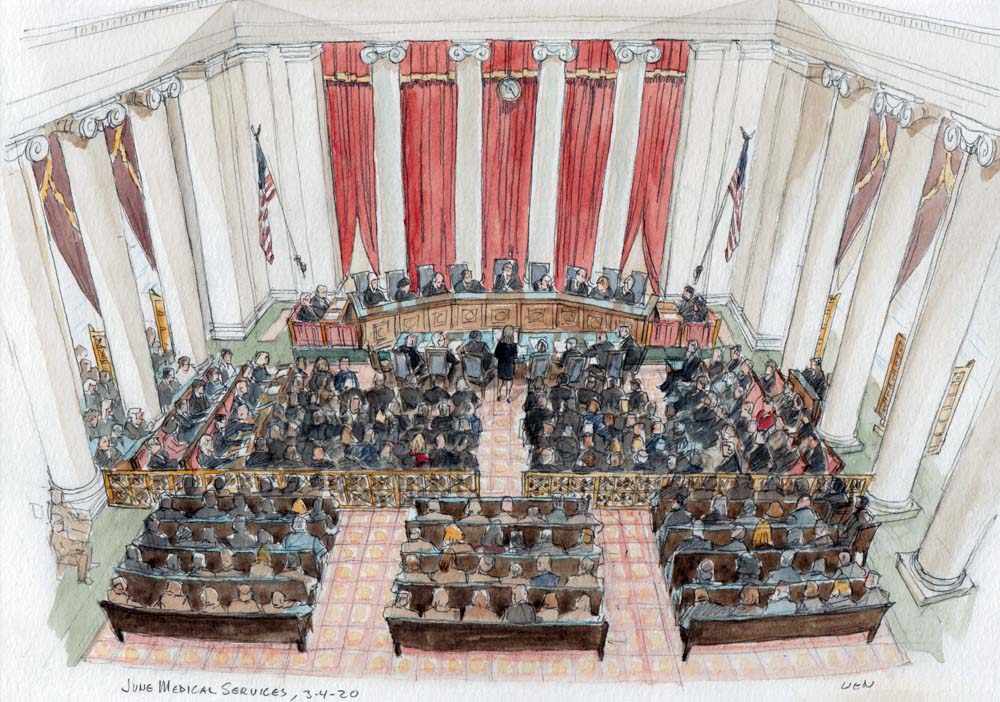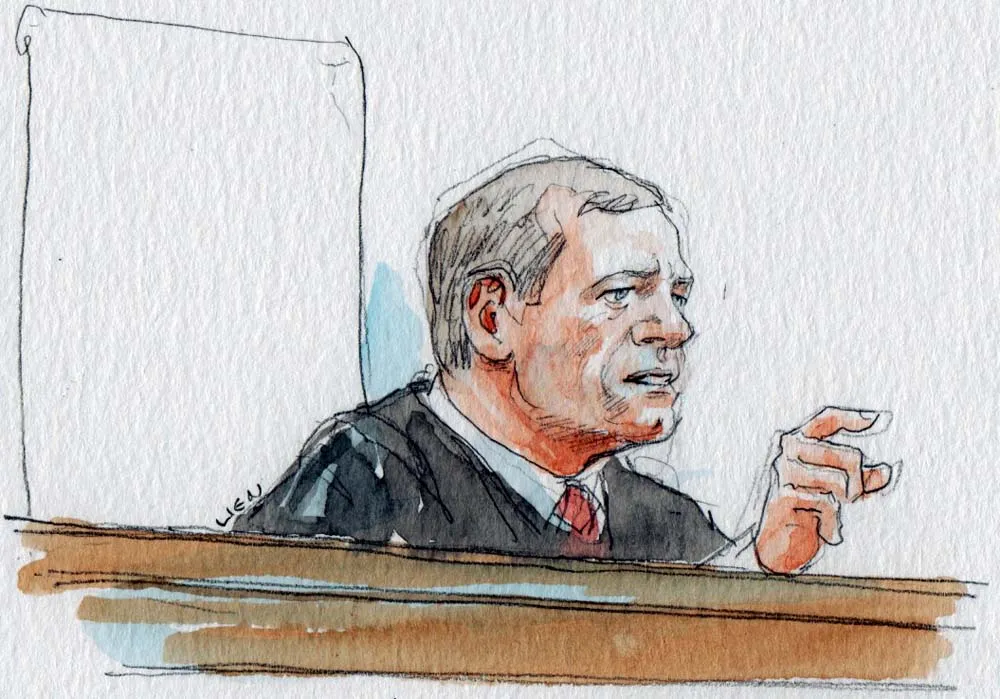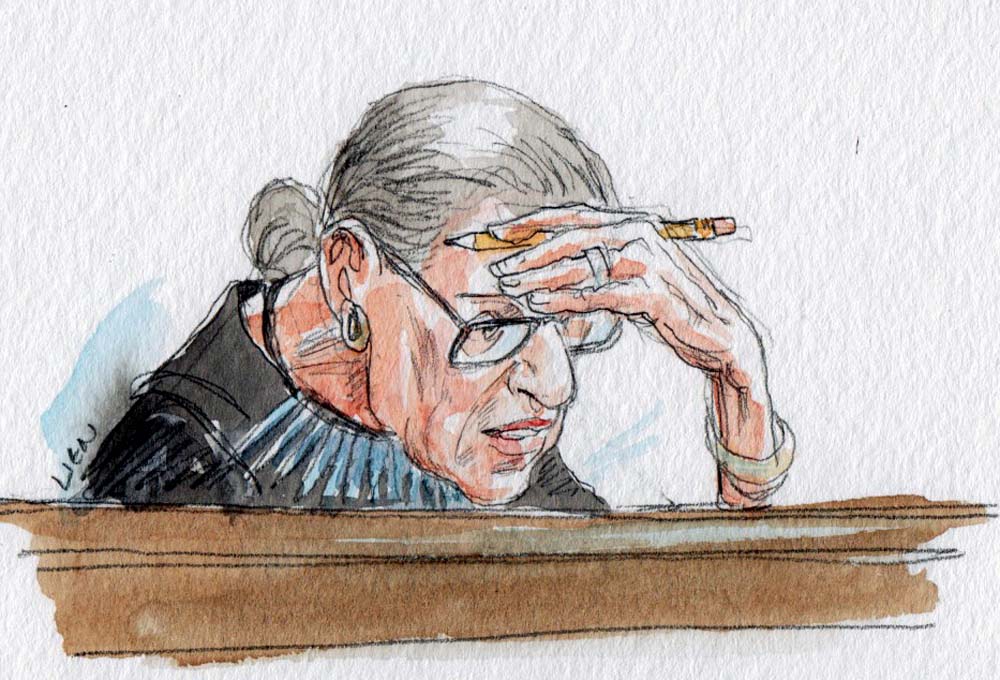A “view” from the courtroom: “Strong feelings” in the latest abortion case

on Mar 4, 2020 at 5:32 pm

The court has just one case today to close out the argument portion of the February sitting, but it’s a big one.
In June Medical Services LLC v. Russo, the justices will consider whether Louisiana’s law requiring abortion doctors to have admitting privileges at nearby hospitals conflicts with the court’s decision just four years ago in Whole Woman’s Health v. Hellerstedt striking down a similar law in Texas. There is also the cross-petition from Louisiana about whether abortion providers have third-party standing to challenge health and safety regulations on behalf of their patients.
Today, virtually every seat in the courtroom will be filled, which doesn’t always happen even in some blockbuster cases.

Bird’s eye view of the courtroom during argument in June Medical Services v. Russo (Art Lien)
In the public gallery, Kathaleen Pittman, the director of the Hope Medical Group for Women clinic in Shreveport, which is owned by June Medical, is here. Nancy Northrup, the president and CEO of the Center for Reproductive Rights, which represents the clinic, is here, as is Amy Metzler Ritter, the chair of CRR.
Amy Hagstrom-Miller, the CEO of Whole Woman’s Health, the consortium of health care and abortion clinics at the center of the Texas case, is also here.
I was told by CRR that none of the several doctors identified in court papers as “Doe” would be in attendance today. Their particular circumstances with respect to the admitting-privileges requirement will be the subject of numerous questions.
At the south end of the front row of the public section sit two U.S. senators who have evidently taken up Chief Justice John Roberts’ invitation to attend a session of the court. One is Sen. Bill Cassidy, a Republican from Louisiana who is trained as a physician. He is among the 207 members of Congress who signed an amicus brief in support of Louisiana organized by Americans United for Life, a prominent anti-abortion group.
The other is Sen. Richard Blumenthal, Democrat of Connecticut, who is among 197 different members of Congress who signed a brief in support of the challengers. The difference in the number of signers of the competing briefs probably does not carry any great weight with the justices.
In the bar section, there is a contingent from the American Civil Liberties Union, including Louise Melling, the deputy director and director of its Center for Liberty, which oversees abortion rights and other issues. Also in the courtroom today is Ilyse Hogue, the president of the National Abortion Rights Action League.
At the counsel table on the left, Julie Rikelman of CRR, who will argue for June Medical Services, arrives with her co-counsel, including Travis Tu of CRR and Jeffrey Fisher of Stanford Law School and O’Melveny & Myers.
Meanwhile, the Louisiana entourage arrives to defend the state’s law, including Louisiana Attorney General Jeff Landry and Solicitor General Elizabeth Murrill, who will argue the case. They are joined in the bar section by U.S. Rep. Mike Johnson, a Republican from Louisiana’s 4th district, who will video tweet afterwards to say that he helped defend the law in the federal district court before being elected to Congress in 2016 from the district that includes Shreveport.
Abortion clinics in the Shreveport, Baton Rouge and New Orleans areas are the focus of this litigation, but because Hope Medical Clinic is in Shreveport, there is a bit more attention on that medium-sized city.
This might be a good place to mention that your reporter once lived in Shreveport, which is in northwest Louisiana and might be said to have more in common with button-down Dallas and conservative East Texas than it does with the “laissez les bon temps rouler” vibe of New Orleans and southern Louisiana. This Chicago native was a bit of a fish out of water in that sleepy burg. I’ll put it this way. Seemingly right after I left after two years at a newspaper job there, the region gained two, um, cultural innovations that would have made it a more interesting place to live: a minor league hockey franchise and riverboat gambling. Also, somewhat improbably, the area became one of those non-Hollywood film production locations, so you might occasionally read that one star or another was arrested in a local bar fight “while he was filming a movie in Shreveport.”
Among the representatives of groups supporting the Louisiana law here today are Steven Aden and Clark Forsythe of Americans United for Life and Jordan Lorence and John Bursch of the Alliance Defending Freedom.
Just 10 minutes before the start of court, Ashley Kavanaugh, the wife of Justice Brett Kavanaugh, arrives and takes her seat in the VIP section. She is soon followed by Joanna Breyer, the wife of Justice Stephen Breyer, and Jane Roberts, the wife of the chief justice.
Top court officers also fill most of the seats reserved for them. But retired Justice Anthony Kennedy, who provided the crucial fifth vote for striking down the Texas regulations in Whole Woman’s Health, is not in the courtroom today.
As the argument proceeds, demonstrators on both sides of the abortion issue are holding their competing rallies on the sidewalk outside the court. No one inside the courtroom is aware of the contretemps that Sen. Charles Schumer of New York, the Democratic leader, is evidently causing with his remarks to the abortion rights demonstrators, which will later elicit a public response from the chief justice.
Amy Howe has this blog’s main account of the hourlong argument.
Just minutes into Rikelman’s presentation on behalf of June Medical Services, a cellphone chime goes off, followed by a bell. The culprit is not evident, though it does not appear to be a member of the court. Whenever I appear before a student group or others to discuss the court, I mention the time in 2017 when Breyer inadvertently brought his phone into the courtroom and, of course, it rang. The students whose phones have long been regulated in school really identify with the justice.
When the mystery phone isn’t pinging and chiming, as it does a couple more times throughout the hour, there are two distinct vibes to the argument. One revolves around the fact that the newest members of the court are facing their first argument in an abortion case. Justice Neil Gorsuch does not ask a single question. Kavanaugh, meanwhile, has quite a few.
“Are you saying that admitting privileges laws are always unconstitutional, such that we don’t have to look at the facts state by state?” he asks Rikelman. “Or are you saying that actually you do look at the facts state by state, and in some states, admitting privileges laws could be constitutional, if they impose no burdens?”
She holds her ground in several variations of the question, maintaining that such laws serve no valid state interest.
Kavanaugh asks five questions of Rikelman, one of Principal Deputy Solicitor General Jeffrey Wall, who is arguing on behalf of the U.S. government in support of Louisiana, and none of Murrill.
For the other members of the court, the vibe is that positions are well staked out on this divisive issue.
Justice Samuel Alito, a member of the minority in Whole Woman’s Health, sharply questions Rikelman on the third-party standing of the abortion providers, finding several of her answers “amazing” or “highly debatable.”

Roberts asks a question (Art Lien)
As for the other dissenters in Whole Woman’s Health, Justice Clarence Thomas is silent as usual while Roberts asks questions that will be highly scrutinized but don’t seem to reveal his views.
“Counsel, do you agree that the inquiry under Hellerstedt is a factual one that has to proceed state-by-state?” he asks of Rikelman. He poses a variation of that question to both Murrill and Wall.
“[W]hy do you look at each state differently if the benefits of the law—they’re not going to change from state-to-state?” the chief asks Wall.
The remaining members of the majority in Whole Woman’s Health—Justices Ruth Bader Ginsburg, Stephen Breyer, Sonia Sotomayor and Elena Kagan—each have vigorous questions that show their skepticism of the Louisiana law’s constitutionality.

Ginsburg ponders the issue at hand (Art Lien)
Ginsburg gets a laugh when she asks Rikelman a friendly question about Craig v. Boren, a 1976 case involving disparate legal drinking ages for young men and women, in which she filed an amicus brief when she was with the ACLU. The decision helps bolster the abortion providers’ third-party standing claim.
“You made a point about Craig versus Boren, that the ostensible purpose of the law was to save the vulnerable young men from the evils of 3.2 beer?” Ginsburg says.
“That’s correct, your honor, and the court allowed the saloon keeper to bring the third-party standing claim,” Rikelman says.
Ginsburg seeks repeatedly to knock the state’s rationales for its admitting-privileges requirements.
“Is it not the fact that most hospitals in Louisiana, in order to get admitting privileges, you have to admit a certain number of patients?” she asks Murrill. “Abortion providers will never, … if they’re not also doing obstetrics and gynecology, they will never qualify because their patients don’t go to the hospital.”
Breyer, who wrote the majority opinion in Whole Woman’s Health, has an exchange with Wall late in the argument that seems to summarize the ideological gridlock over abortion rights.
“How do you deal with this?” Breyer asks Wall. “I have read the briefs. I understand there are good arguments on both sides. Indeed, in the country people have very strong feelings and a lot of people morally think it’s wrong and a lot of people morally think the opposite is wrong.”
“And in [Planned Parenthood of Southeastern Pennsylvania v.] Casey, and the later cases,” he adds, “I think personally the court is struggling with the problem of what kind of rule of law do you have in a country that contains both sorts of people.”
When the argument is over, the clinic director, the advocates and the politicians make their way quickly to the court’s plaza to address the media, and then to the wide sidewalk, where “both sides” of this intractable issue hold their loud, competing rallies.


